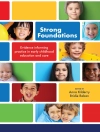Viewing children as ‘experts in their own lives’, the Mosaic approach offers a creative framework for understanding young children’s perspectives through talking, walking, making and reviewing material with an adult. This book demonstrates how children’s views and experiences can stay in focus in early childhood provision. The multi-method approach brings together digital tools with interviewing and observation to enable adults to review current practice and implement change with children.
Combining the authors’ successful books Listening to Young Children and Spaces to Play into an expanded and fully updated third edition, this book builds on the authors’ original ground-breaking work by commenting on the development and adaptation of the Mosaic approach, along with case studies of the Mosaic approach in action in four countries: England, Denmark, Norway and Australia. Alongside guidance on using and adapting the framework with young children, older children and adults, there is new material on the ethical and methodological issues involved.
Cuprins
Foreword – Peter Moss, Emeritus Professor of Early Childhood Provision at the Institute of Education, University of London; Preface to the third edition;1. A framework for listening – Introduction. Starting points. The framework for listening; Reflective questions; 2. Listening to Young children: developing the Mosaic approach – Introduction. Stage One: children and adults gathering documentation. Observation. Interviews with children. Children’s photographs. Tour. Map making. Role play. Parents’ perspectives. Practitioners’ perspectives. Researcher’s perspectives. Stage Two: Piecing together information for dialogue. Reflection and interpretation. Bringing the mosaic together. Pre-verbal children. Children with speech. Reflection into practice. Recognising the unexpected. Mosaic approach with refugee children; 3. Spaces to Play: adapting the Mosaic approach – Introduction. Stage One: gathering children’s and adults’ perspectives. Observation. Children’s photographs and book-making. Child-led tours. Map making. Magic carpet. Interviews with children. Interviews with practitioners. Interviews with parents. Stage Two: discussing the material. Reviews with children. Reviews with practitioners. Stage Three: deciding areas of continuity and change. Places to keep: the ‘caterpillar’. Places to expand: the house. Places to changes: the fence. Places to add: seating and digging. Evaluation. Changes into practice. Discussion. Reflective questions. 4. Case studies: working with the Mosaic approach – Introduction. Case Study One, UK. Case Study Two, Denmark. Case Study Three, Norway. Case Study Four, Australia. Discussion, ; Chapter 5: Ethical and methodological questions – Introduction. Questions. Conclusion; Epilogue; Appendix: Further reading about the Mosaic approach and schedules ; References; Index
Despre autor
Peter Moss is a Professor at the Faculty of Children and Learning, Thomas Coram Research Unit. He has wide-ranging research interests including services for children, the children’s workforce, democratic practice in children’s services, gender issues in work with children, social pedagogy and radical education. Peter is widely published.












